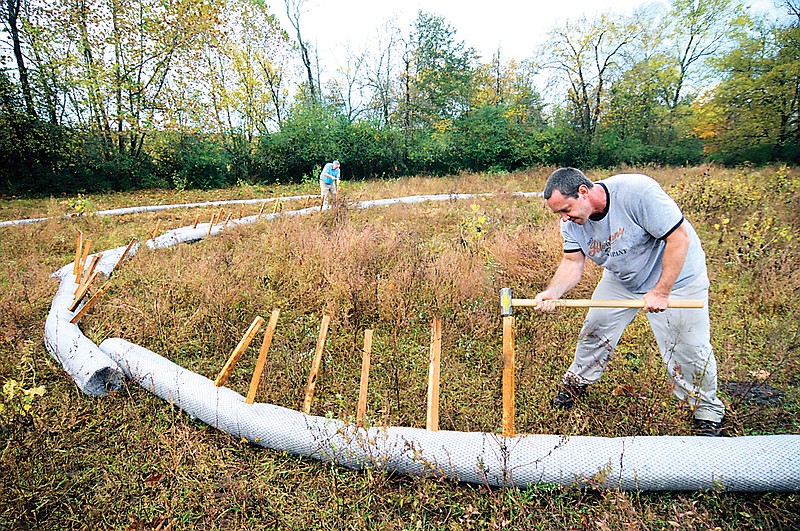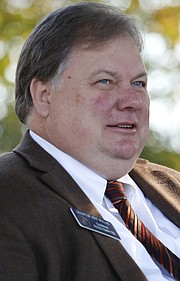VARNELL, Ga. - In a tiny spring in Whitfield County, some unusual partners are at work giving a second annual housecleaning to the home of a rare fish.
The carpet industry, the Tennessee Aquarium Conservation Institute, the Conasauga River Alliance and the Georgia Department of Natural Resources have joined forces to catch just over 200 coldwater darters - a 2 1/2-inch fish that lives in only about a dozen springs in the world. Their home, Colvard Spring near Varnell, is one of the three largest populations in the fishes' tri-state universe of 12 to 15 streams.
After about a monthlong vacation while silt is vacuumed from their spring, the fish will be brought back to the spiffed-up home.
To accomplish this not-so-simple feat, the silt-laden water pumped out of the spring is spewed onto a nearby farm field, then filtered through old, discarded carpet while gravity runs the water back to the spring.
Yes, used carpet - reinvented.
"It's one of those right things to do," said Tim Stairwell, the entrepreneurial owner of Geohay, a company that last year recycled about a million pounds of discarded carpet into a filter that looks like tightly wound dryer lint woven into a long netted pillow.
The shredded and rewoven carpet fibers - tested to ensure no industry chemical is leaching - removes about 90 percent of silt and cloudiness from water, Stillwell said.
"It's working great," Anna George said Monday as she watched water gush from the vacuum hose and flow to the 200-plus-foot roll of Geohay staked in a semi-circle.
Last year's effort - a first anywhere - wasn't so smooth.
Workers and volunteers from the state and the environmental groups spent about two weeks in October and November 2009 scooping darters from the privately owned, silt-strangled spring, only to be frustrated when some fancy vacuum filter bags didn't work as planned.
After more bags burst than not, the cleanup crew loosed the pumped water on the same field with less-efficient straw wattles.
They chalked it up to experience and took comfort in the sediment they were able to remove. But this year, they're back for more.
Georgia state Sen.-elect Charlie Bethel, R-Dalton, watched Monday as muddy spring water made its way along the ground to the Stillwell's $3,000 or $4,000 donated installation of Geohay.
"It's an interesting project," said Bethel, who also works as a human resources manager at commercial carpet producer J&J Industries in Dalton.
"These are the sorts of technologies we're all going to have to be more comfortable with," he said of the recycled carpet-turned environmental filter. "Water quality is important to all of us whether we're a darter or we drink from a municipal or private well."
Reweaving history
Stillwell and Jeremy Stroop, operations manager of the Carpet America Recovery Effort, said about 6 billion pounds of carpet is landfilled each year, and 90 percent of that carpet is made in Dalton. Some of the Geohay was given a successful try-out earlier this year mopping up after the oil spill in the Gulf, they said.
"(Industrywide,) we've been able to divert about 1.6 billion pounds of carpet from landfills since 2002, and every little bit of help from entrepreneurs like Mr. Stillwell is a help," he said of Geohay's 1 million-pound recovery last year.
Josh Smith, director of the Conasauga River Alliance, said clear-cutting in the area decades ago caused the spring to become silted. Now that the land has recovered, the spring can, too, with a little help.
George said the spring pumping will continue for nine days, spread over three weeks. Then, after the spring has a week or so to settle, the darters now resting at the Aquarium's Cohutta fish hatchery will be returned to the spring.
"A lot of people are watching this project," she said of the cleanup aimed at restoring habitat for a very sensitive fish that needs a clear, gravel stream bottom to feed and breed.
"We're the only species capable of modifying its habitat. We've done that a lot in the past with bad results," she said. "Now we're capable of recognizing that and modifying our habitat to make it better. That's why I think we have the responsibility to take care of it."

